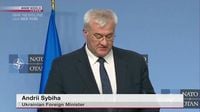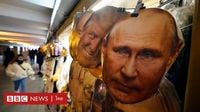As tensions continue to escalate in Eastern Europe, NATO Secretary General Jens Stoltenberg acknowledged on April 4, 2025, that the alliance has significantly underestimated Russia's military capabilities. This admission came during a press conference following a two-day meeting with foreign ministers from NATO member countries in Brussels, where discussions centered on the ongoing conflict in Ukraine and the need for a united front against Russian aggression.
Stoltenberg emphasized that the consensus among NATO allies is clear: "Russia remains the number one threat to NATO." This statement reflects a growing recognition within the alliance that previous assessments of Russian intentions and capabilities were overly optimistic. The Secretary General noted that the collaboration with artificial intelligence has provided new insights into the situation, further underscoring the complexities of modern warfare.
Ukrainian Foreign Minister Andriy Sybiha, who participated in the NATO meeting, echoed Stoltenberg's sentiments, urging member states to implement stricter measures against Russia. He called for increased pressure on President Vladimir Putin to halt military operations in Ukraine, stating, "Instead of acknowledging the need for peace, Putin continues to discuss demands and conditions. Russia must take peace seriously, and it is time to increase pressure on them."
Sybiha's comments highlight the urgency felt by Ukraine and its allies as they seek to find a resolution to the ongoing conflict. He praised the U.S. for its efforts to negotiate a 30-day ceasefire but criticized the Russian leadership's reluctance to engage in meaningful dialogue. "The place to accept Putin along with old grievances and hatred is no longer acceptable," he added, emphasizing the need for Russia to align itself with the international community.
The NATO foreign ministers also discussed various strategies to bolster financial assistance to Ukraine, with the U.S. advocating for increased funding and defense spending among member states. Japan's Foreign Minister Yoko Kamikawa participated in the discussions, asserting that a strong NATO benefits not only Western nations but global security as a whole. He stated, "We must reaffirm and clearly show that the West is united. Furthermore, Northern Europe must also develop a peacekeeping and nuclear program, too."
Meanwhile, the geopolitical landscape continues to shift, with the United States grappling with its approach toward Russia. A report from Axios highlighted that Russia was notably absent from the list of countries facing import tariffs imposed by former President Donald Trump. White House spokesperson Caroline Levitt explained that ongoing sanctions against Russia hinder any meaningful trade relations. This exclusion has raised eyebrows, especially considering that countries with lesser trade ties, such as Syria, remain on the tariff list.
The U.S. began imposing significant sanctions on Russia following its full-scale invasion of Ukraine in 2022, a move that has drawn mixed reactions domestically. Trump, who has historically maintained a more favorable stance toward Russia compared to current President Joe Biden, emphasized the need for a ceasefire in Ukraine during discussions with his administration's committees. He recently threatened to impose a 50% tariff on countries importing oil from Russia unless Putin agrees to a ceasefire.
Russian state media has reacted to these developments with skepticism. Reports from Rossiya 24 and other outlets described how Russia's absence from the tariff list has disappointed many in the West. They noted that while there are no new tariffs directed at Russia, the existing sanctions create a significant barrier to trade. "No tariffs are imposed on Russia, but it is not because Russia is treated specially; it is simply because Western countries have already sanctioned our nation," stated a report from Rossiya 1.
In 2024, the value of goods imported from Russia was approximately $3.5 billion, primarily consisting of nuclear fuel, chemical fertilizers, and various metals, according to the U.S. Office of Trade Representative. This figure underscores the complex economic ties that exist despite political tensions. The Russian government has also pointed to the absurdity of some tariff decisions, with reports highlighting that even uninhabited territories like Heard Island were included in Trump's tariff list.
As the situation evolves, Ukraine's economic landscape remains precarious. Yulia Swiridenko, Ukraine's Deputy Prime Minister, noted that U.S. customs duties would disproportionately affect small producers in her country. "We are accelerating the matter to make it go well," she stated, emphasizing the importance of fair customs duties for both nations.
Despite the challenges, Ukraine remains committed to strengthening its partnership with the U.S. and NATO. Swiridenko pointed out that in 2024, Ukraine's exports to the U.S. were valued at $874 million, while imports from the U.S. reached $3.4 billion. "Ukraine has great things that will be given to the alliance in a stable partnership and shared interests," she said, highlighting the potential benefits of closer economic ties.
The discussions at NATO reflect a broader understanding that the security landscape in Europe is changing rapidly, requiring a united response to Russian aggression. As member nations consider their next steps, the stakes remain high, not just for Ukraine, but for the stability of the entire region. With calls for increased military support and financial assistance growing louder, NATO's resolve will be tested in the coming months as it seeks to navigate this complex geopolitical landscape.





